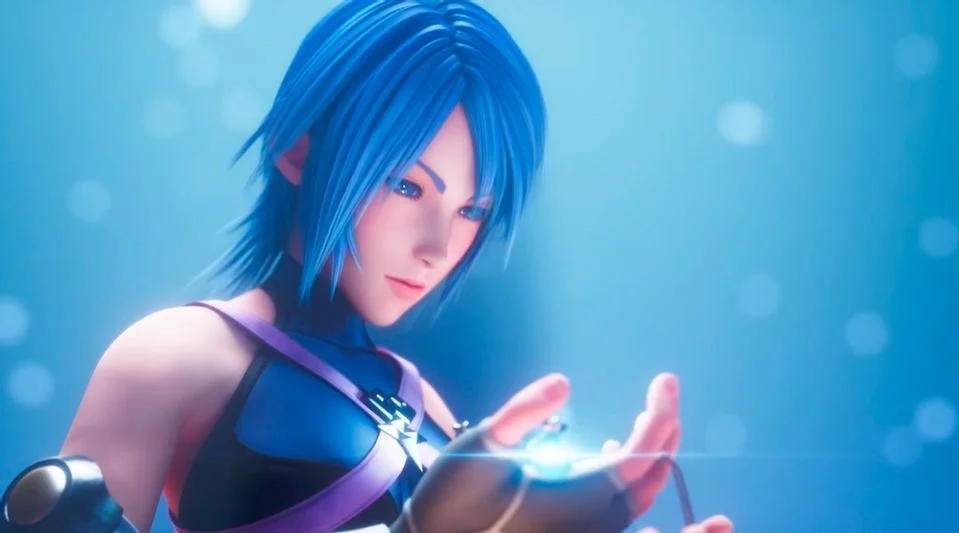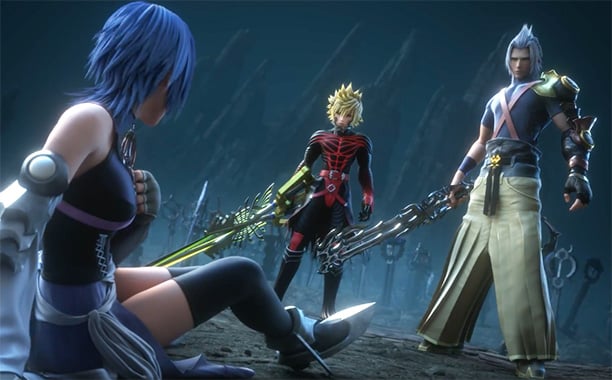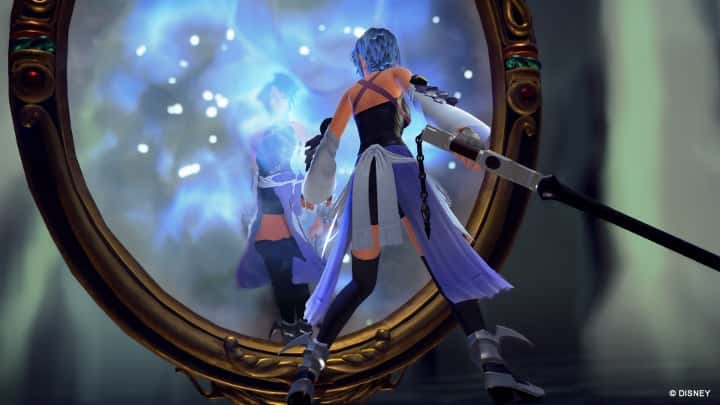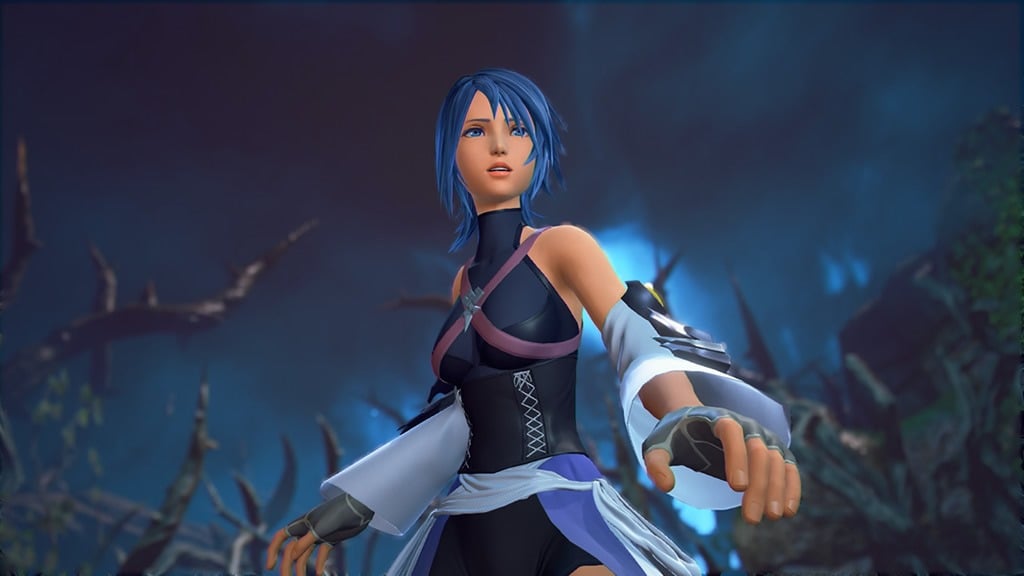Features
Kingdom Hearts 0.2: A Fragmentary Passage & The Prologue That Never Was
For better or worse, A Fragmentary Passage is its own distinct entry in the Kingdom Hearts canon– the Prologue that Never Was.

What makes Kingdom Hearts 0.2: A Fragmentary Passage unique?
“May our hearts be our guiding key.”
Good first impressions matter, and how a game opens can convey how the next few hours will play out: mechanically, conceptually, narratively, fundamentally. A good opening sets the stage for what’s to come, gathering momentum that’ll keep the first act engaging while all the pieces fall into place for the rest of the experience. While there’s no right or wrong way to handle or structure an opening, Kingdom Hearts set a precedent rather early on for strong, memorable openers. Beyond the original Kingdom Hearts’ excellent use of Dive to the Heart and Destiny Islands as tutorial stages that set up the rest of the narrative, Kingdom Hearts II introduced the concept of bonafide prologues to the series.
As if nothing out of the ordinary were happening, Kingdom Hearts II opened not with audiences taking control of familiar protagonist Sora (or even his rival Riku who was previously playable in Chain of Memories), but newcomer Roxas– a blond-haired kid who briefly appeared at the very end of Reverse/Rebirth. In 2005, it was hard not to immediately wonder why some nobody like Roxas was suddenly Kingdom Hearts’ main character. Over a methodical three-hour prologue/tutorial hybrid, however, Kingdom Hearts II makes a strong case for Roxas’ inclusion. Destined to reunite with Sora and lose his own individuality, Roxas adds deeper pathos to both KH II and Sora’s arc– something that wouldn’t have been possible had audiences not spent three hours with Roxas beforehand.
Roxas’ prologue also manages to get the basic tutorial beats out of the way in an engaging manner by sheer virtue of the memorable framing. It’s easy to go through the expected motions when the focus is on the mystery at the center of the prologue, and not the gameplay tutorial itself. Structurally, Roxas’ prologue in Twilight Town is a considerable expansion of Sora’s early game-doings in Destiny Islands. Players see a whole week of Roxas’ life, each day offering something new in thematically, narratively, or just in terms of gameplay. Everyday ultimately builds to Roxas returning to Sora, but the day to day structure keeps the prologue well-paced and even results in some days feeling like their own contained vignettes.
Even if the gameplay expands considerably by the time Sora becomes playable, it’s hard to say goodbye to Roxas. His weeklong tutorial in Twilight Town contextualizes Kingdom Hearts II around Roxas having to give up his life for Sora. In truth, a life that was never really his. But that in itself leads into Sora’s arc, and him coming to the realization that Roxas does have his own life and identity. KH II’s prologue isn’t just showcasing how Roxas is Sora’s other, it’s emphasizing at the very beginning of the game that Roxas has agency and is his own person. It’s an excellent use of a prologue, and that it gets the tutorial out of the way creatively is a plus.

Perhaps more important than anything, however, Roxas’ opening kicks Kingdom Hearts II off with a considerable amount of gravity. Playing as Roxas instead of Sora was just as much a statement in and of itself to expect the unexpected when it comes to Kingdom Hearts, as it was a precedent set. Of course, Kingdom Hearts having a Roxas-esque prologue once isn’t enough to assume that the next numbered entry would follow suit, but thinking it would be foolish not to, isn’t a hard conclusion to reach. And to Square Enix’s credit, the intent was for Kingdom Hearts III to open with a Roxas-esque prologue.
Released as 1/3 of Kingdom Hearts HD 2.8 Final Chapter Prologue, Kingdom Hearts 0.2: Birth by Sleep – A Fragmentary Passage is the “Final Chapter Prologue” in question. Serving the exact same structural role Roxas’ prologue did, A Fragmentary Passage is Kingdom Hearts III’s prologue that never was. Detached from its main game to give audiences a taste of Kingdom Hearts III sooner rather than later, 0.2 takes place after the end of Birth by Sleep, leading into the very first game’s ending. Rather than serving as an immediate narrative lead-in like Roxas’ prologue, 0.2 is a more thematic opening. One that sees the hope and optimism central to Aqua’s character and to Kingdom Hearts challenged.
Trapped in the Realm of Darkness with no concept of time, Birth by Sleep’s protagonist Aqua wanders aimlessly with no exit in sight. Where Roxas’ prologue was made up of mostly cutscenes and downtime, Aqua’s setting demands action immediately. She’s stuck in the incredibly hostile Dark World, where Heartless can swarm her at any given moment. Not just that, the geography of the Dark World is incredibly eclectic, twisting familiar locations from Birth by Sleep into M.C. Escher-esque impossible objects. Roxas & Aqua’s prologues are night & day tonally, with her framing sparking action right out the gate.
Unlike Roxas who has his Keyblade taken away and given back at multiple different intervals, Aqua is combat-ready out the gate and only gains more abilities with time. While she can only use her Keyblade at first, she eventually gains access to four -Ga level spells, a double jump, an air slide, revamped Flowmotion, and a Shotlock that’s actually balanced. This is on top of Aqua’s already acrobatic movement. Aqua’s floaty swings can have her zooming from one Heartless to the next in no time flat. One particularly cute touch is that Aqua starts 0.2 at level 50, just a few levels higher than where most audiences’ Aquas would’ve capped off at the end of Birth by Sleep’s Secret Episode.

Reading that back, it’s not hard to understand why Nomura and his team ultimately decided to release A Fragmentary Passage “stand-alone:” it’s the perfect tech demo for Kingdom Hearts III. Unlike Roxas’ prologue which was primarily set-up, A Fragmentary Passage offers players an opportunity to play with a high-level kit right out of the gate. Aqua becomes a showcase of what audiences can expect by the end of their Kingdom Hearts III journey: non-stop action with hordes of enemies and a healthy dose of gameplay variety. Even the Realm of Darkness inspires immediate hope that Kingdom Hearts III’s level design will be more than just empty arenas with chests and baddies littering the ground.
In isolating the prologue into its own game, A Fragmentary Passage is allowed to breathe far better than Roxas’ prologue. For as memorable as Kingdom Hearts II’s opening is, it’s still a three-hour tutorial. A very meaningful & important one, but lacking in meaningful gameplay to engage with. Not the case with 0.2 which gives audiences a playground to experiment with KH III’s gameplay revisions. One of the most notable is the inclusion of Situation Commands. Building off of Birth by Sleep’s Command Styles & Kingdom Hearts II’s Reaction Commands, Aqua can chain attacks together into combat specific Situation Commands.
Chain a bunch of Thundagas together and Aqua will gain access to the overwhelmingly powerful Thundaja; pummel enemies with melee attacks and Aqua can trigger her Spellweaver style; fight side by side with Mickey and Aqua & the King will rip through Heartless together. By design, Situation Commands encourage more varied use of Aqua’s abilities, rewarding players who experiment with everything at their disposal. It can make for some very hectic set pieces, but that’s arguably fitting given the hostility of Aqua’s environment.
There are even optional Objectives that Aqua can complete to unlock new cosmetics, giving A Fragmentary Passage rather unique replay value in the context of the series. Beyond that, there are the traditional secret bosses, and 0.2 actually does do well in this regard– featuring a great one on one duel against Zodiac Phantom Aqua, a boss most players will need to grind for, but one that’s worth it considering how well designed she is. For all intents and purposes, A Fragmentary Passage stands as its own game and more than just Kingdom Hearts III’s prologue. But that’s really just at first glance.
When all is said and done, A Fragmentary Passage truly can’t actually stand on its own. In truth, there’s far too much important set up for Kingdom Hearts III that simply would have worked better had the two games been connected. Aqua’s multiple fights against the Demon Tower & Tide are carried on by Sora & Riku present day; the tone of the Realm of Darkness establishes right away that Kingdom Hearts III will be dealing with darker subject matter (as evidenced by Aqua’s deteriorating psyche;) and Aqua’s sheer power directly contrasts her with Sora’s lack of power.

Sora’s entire arc in Kingdom Hearts III is about regaining his strength– literally, psychologically, emotionally, mentally– and having audiences take control of the comparatively powerful Aqua as part of the prologue would have given Sora’s arc considerably more meaning in the context of Kingdom Hearts III specifically (rather than just the greater series.) Aqua shows us what Sora can become, and from there on out we have a comparison point. By level 50, Sora could perhaps be at Aqua’s level. Until then, however, players have to deal with throwing out Fire and Firas instead of their beloved Firagas and Firajas. Going from Aqua to Sora puts into perspective just how much power Sora has lost.
As is, Kingdom Hearts III opens with a fun romp through Olympus– one that is thematically appropriate and cuts right to the chase- but it’s hard to feel like something isn’t missing. It would be as if Kingdom Hearts II opened with Sora waking up, Roxas’ prologue existing as its own fleshed out, three-hour game. It’s not a bad idea in theory, but suddenly Kingdom Hearts II is no longer contextualized through Roxas and Sora’s relationship– not truly. It’s just the next beat in the Kingdom Hearts story, which is what A Fragmentary Passage becomes when it’s disconnected from Kingdom Hearts III.
“For better or worse, A Fragmentary Passage is its own distinct entry in the Kingdom Hearts canon– the Prologue that Never Was.”
Again, though, there is no right or wrong way to handle an opening and there are merits to both approaches. Roxas’ prologue is the framing that drives the heart of Kingdom Hearts II, but Aqua’s is an adventure that can be digested stand-alone and is frankly more fun to play as a result. Unfortunately, this, in turn, causes Kingdom Hearts III to feel as if it’s missing its opening. Considering III wraps up the only story arc the series had been building for nearly two decades, a three-hour prologue starring Aqua likely wouldn’t have rubbed anyone the wrong way. It would only make Kingdom Hearts III a better game – albeit at the expense of itself. And that’s the rub, isn’t it?
Prologues are a double-edged Keyblade. Had A Fragmentary Passage been included in Kingdom Hearts III, it almost certainly wouldn’t have any of its bonus content or objectives; but that in itself is part of what makes it such a compelling experience. Aqua’s prologue isn’t just a retread of Roxas’. It’s an actual game with a beginning, middle, and end. Aqua develops, the gameplay evolves, and there’s much more to do than going from point A to point B. And while all one needs to do is play A Fragmentary Passage right before Kingdom Hearts III to emulate the full experience, the fact of the matter is that these games are not connected that way. A Fragmentary Passage should be Kingdom Hearts III’s prologue, but it isn’t. Not in the way the series previously defined prologues.
Still, maybe that’s for the best. Ten years from now, anyone who wants a taste of Roxas’ prologue will need to contend with it being just a piece of Kingdom Hearts II’s puzzle, whereas A Fragmentary Passage exists fragmented from Kingdom Hearts III. The game connects well and fits where it belongs, but there’s no obligation to play III after finishing 0.2. As it is, 0.2 is Aqua’s story and Aqua’s alone. It’s framed through Mickey setting up her rescue in III, but the heart of 0.2 ultimately lies not in what it can do for Kingdom Hearts III, but what it does for itself. For better or worse, A Fragmentary Passage is its own distinct entry in the Kingdom Hearts canon– the Prologue that Never Was.

-

 Features4 weeks ago
Features4 weeks agoGet Ready: A Top Isekai Anime from the 2020s Is Headed to Hulu!
-

 Features3 weeks ago
Features3 weeks agoSocial Gaming Venues and the Gamification of Leisure – A New Era of Play
-

 Features3 weeks ago
Features3 weeks agoSolo Leveling Snubbed?! You Won’t Believe Who Won First at the 2025 Crunchyroll Anime Awards!
-

 Culture3 weeks ago
Culture3 weeks agoThe Global Language of Football: Building Community Beyond Borders
-

 Technology4 weeks ago
Technology4 weeks agoIs Google Binning Its Google Play Games App?
-

 Technology4 weeks ago
Technology4 weeks agoHow to Download Documents from Scribd
-

 Guides4 weeks ago
Guides4 weeks agoBoosting and WoW Gold: Why Prestige and Efficiency Drive the Modern MMO Player
-

 Technology2 weeks ago
Technology2 weeks agoGamification and Productivity: What Games Can Teach SaaS Tools
-

 Features2 weeks ago
Features2 weeks agoFarewell to a Beloved 13-Year-Old Isekai Anime That Brought Us Endless Laughter
-

 Features1 week ago
Features1 week agoThis Upcoming Romance Anime Might Just Break the Internet; Trailer Just Dropped!
-

 Features3 weeks ago
Features3 weeks agoWait, What?! Tom & Jerry Just Turned Into an Anime and It’s Glorious!
-

 Culture2 weeks ago
Culture2 weeks agoIs the Gaming Industry Killing Gaming Parties?



















